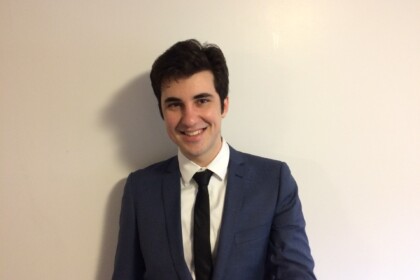
Projects & Materials

Making the grade in STEM from CCCC to Northeastern University

Gus Grosenbaugh always loved math. A Falmouth native, he spent his early school years participating in extracurricular math clubs. The subject came easily to him until he got a bit older, and by the time he graduated from Falmouth High school in 2014, he had stepped back from numbers. Until he rediscovered them at Cape Cod Community College, where he focused on math, physics, and economics, and ended up going all in for math again. Today Gus is a math student at Northeastern University, and while he takes computer science for employable skills, number theory remains his first love. As the second student featured in our Students in STEM Profile Series, Gus was happy to share the story of his journey from 4C’s to Northeastern, and his plans for his next adventure. When he is not pursuing math, he can be found rock climbing or playing the piano for fun.
1. What are you doing now?
I’m at Northeastern studying math, and right now I’m applying for co-op positions. Northeastern has a strong experiential learning program with six-month internships designed to help you graduate with specific and robust work experience for your resume. I’m looking to make the most of my education and the outreach of Northeastern. They have a prep class to guide you through the process of applying and interviewing, and I'm actually doing a mock interview today via the co-op, where there are a couple of positions I'm applying to. I took economic classes at 4C’s, and I’d like to do some sort of financial oversight, to help regulate banks. I would also like to work in a lab or a company that does food engineering research to keep food fresh longer and reduce food waste, or I might handle data in a lab. So I’m casting a wide net.
2. What did you do at 4C’s and how did 4C’s help get you where you are now?
I’m now at Northeastern hoping to graduate with a BA in science and math. At 4C’s I worked toward an Associates in math, and I was really motivated by the faculty at 4C’s. I started there because I wasn't sure a four-year college degree was what I wanted or could complete, but when I met with my advisor Professor Jenifer Alai, she asked me my plans, and it got me thinking about what I wanted to do, which turned out to be 4C’s for two years and then transfer. She, with the other great faculty, helped me stay the course. Physics professor Eric Arznov encouraged me to apply to a five-week program with NASA NCAS (Community College Aerospace Scholars.) The program included lectures, tests, and a research project. I was selected to go to the Langley Research Center for Robotics with students nationwide. This helped get me where I am by making my Northeastern college application more robust. I credit the entire 4C’s math department for contributing to my success.
3. What would you say to your former self knowing what you know now?
I would say to always get comfortable reaching out for help and to get involved in the 4C's community. I did much better when I was involved with clubs and meeting with professors then when I tried to do it on my own. It took me a while to realize that. If high school me listened to future me, his transition to college would be easier if he knew how to ask for help.
4. What is the best part of 4C’s?
For me, the best part is the faculty. Maybe it doesn't have great clout and research funding, and maybe the professors are not Harvard PhDs, but they are not any less committed and passionate about what they do. They have all impacted me positively and it has stuck with me.
5. What is your message to other students who want to follow in your footsteps?
I haven't completed my journey yet and graduated, but I read a study that people do transfer successfully from two years to four-year degrees. Data shows equal chances for graduation and job prospects. I believe going to a two-year college before transferring is viable for job prospects, and cost-effective. It makes sense for me and for other people.
6. Where do you see yourself in five years?
I have the idea I'll be doing something I like, working with people I like working with. You don’t really need a graduate degree or an MA to achieve that. I want to keep as many options as possible open. I don't see the end game, but I still challenge myself.
Article by Mary Petiet